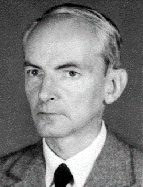

Hooykaas was born into a Calvinist family of goldsmiths. From 1923 to 1930 he studied chemistry at Utrecht University. In 1945 he was appointed to the first history of natural sciences chair in the Netherlands at the Free University of Amsterdam, where he remained until 1967. He then moved to the University of Utrecht, where he stayed until his retirement in 1976. In 1947 he took part in the 5th Congress on the History of Science in Lausanne, where he met Armando Cortesão, a specialist in cartography of the Discoveries and then counsellor for the History of Science and Culture at UNESCO. Hooykaas was vice president for Europe (1967-1976) and then president of the International Committee for the History of Geological Sciences (1976-1984); this was largely due to the importance of his 1959 work, a historical-critical study of the principle of uniformity in geology, biology, and theology. In 1970 he was in charge of the Erasmus Lectures at Harvard University, and in 1975-1977 he took over the Gifford Lectures at the University of St Andrews. He was elected a full member of the Académie Internationale d'Histoire des Sciences in 1957 and of the Royal Netherlands Academy of Arts and Sciences in 1959. For many years, he was an active member of the Christian Society of Scientists and Doctors in the Netherlands. The relationship between religion and science and the origins of modern science were omnipresent themes in his work, an interest based on his conviction that the history of science should be taken seriously as part of cultural history. This led him to study the technical, scientific, and cultural significance of the Portuguese discoveries. Since 1962, he has taught the History of Sciences at the University of Coimbra and collaborated with two professors from this university: his friend Armando Cortesão and Luís de Albuquerque, a mathematician who became a notable historian of Portuguese nautical knowledge. In 1969 he was awarded an honorary doctorate by this university. However, his attempt to develop the history of science in Portugal, especially by sending scholarship holders to the Netherlands, ended up failing (A. Flipse, "Reijer Hooykaas...", 2013; J. D. North, "Eulogy of Reijer Hooykaas", 1994; R. Hooykaas, Selected Studies..., 1983, pp. VII-XXII, 7 and 23; Pereira et al., "Os primórdios do ensino..." [The beginnings of education], 2019, p. 42).
This work is financed by national funds through FCT - Foundation for Science and Technology, I.P, in the scope of the projects UIDB/04311/2020 and UIDP/04311/2020.
